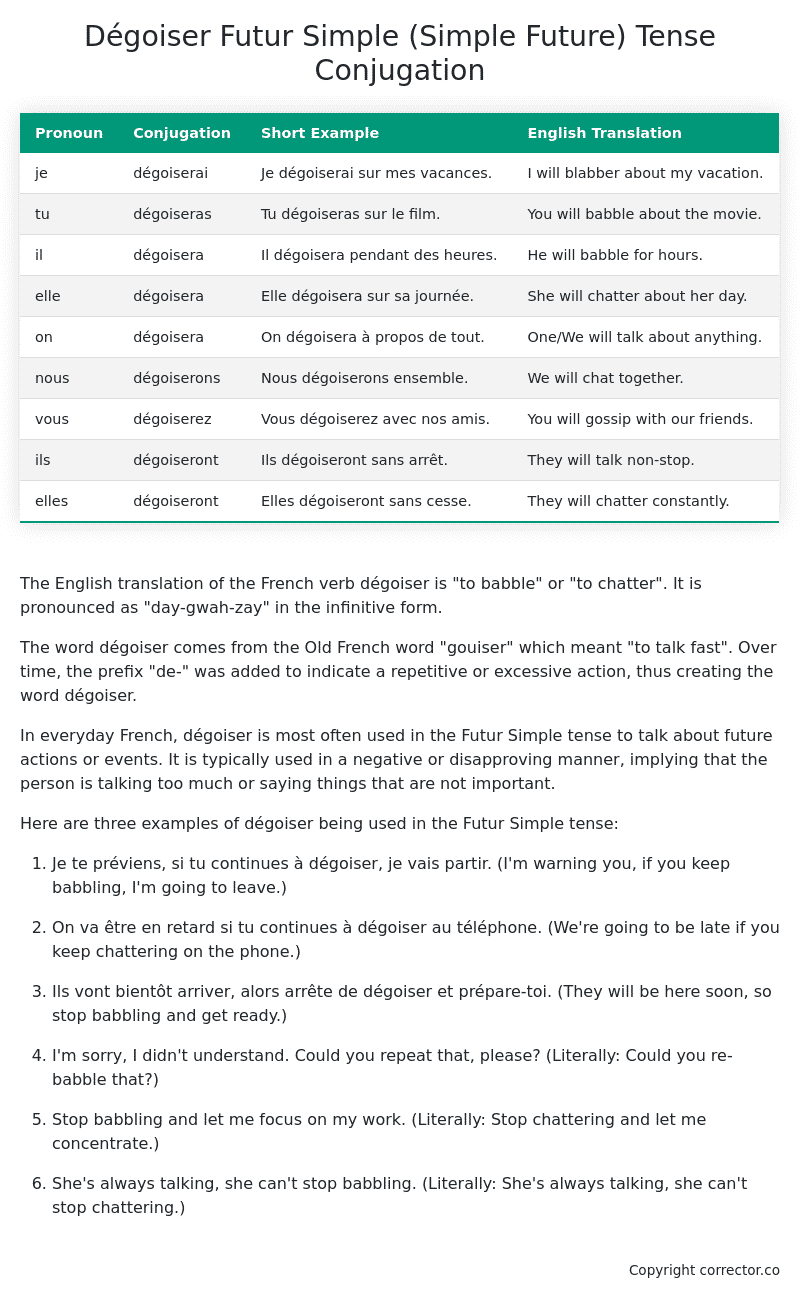Futur Simple (Simple Future) Tense Conjugation of the French Verb dégoiser
Introduction to the verb dégoiser
The English translation of the French verb dégoiser is “to babble” or “to chatter”. It is pronounced as “day-gwah-zay” in the infinitive form.
The word dégoiser comes from the Old French word “gouiser” which meant “to talk fast”. Over time, the prefix “de-” was added to indicate a repetitive or excessive action, thus creating the word dégoiser.
In everyday French, dégoiser is most often used in the Futur Simple tense to talk about future actions or events. It is typically used in a negative or disapproving manner, implying that the person is talking too much or saying things that are not important.
Here are three examples of dégoiser being used in the Futur Simple tense:
-
Je te préviens, si tu continues à dégoiser, je vais partir. (I’m warning you, if you keep babbling, I’m going to leave.)
-
On va être en retard si tu continues à dégoiser au téléphone. (We’re going to be late if you keep chattering on the phone.)
-
Ils vont bientôt arriver, alors arrête de dégoiser et prépare-toi. (They will be here soon, so stop babbling and get ready.)
-
I’m sorry, I didn’t understand. Could you repeat that, please? (Literally: Could you re-babble that?)
-
Stop babbling and let me focus on my work. (Literally: Stop chattering and let me concentrate.)
-
She’s always talking, she can’t stop babbling. (Literally: She’s always talking, she can’t stop chattering.)
Table of the Futur Simple (Simple Future) Tense Conjugation of dégoiser
| Pronoun | Conjugation | Short Example | English Translation |
|---|---|---|---|
| je | dégoiserai | Je dégoiserai sur mes vacances. | I will blabber about my vacation. |
| tu | dégoiseras | Tu dégoiseras sur le film. | You will babble about the movie. |
| il | dégoisera | Il dégoisera pendant des heures. | He will babble for hours. |
| elle | dégoisera | Elle dégoisera sur sa journée. | She will chatter about her day. |
| on | dégoisera | On dégoisera à propos de tout. | One/We will talk about anything. |
| nous | dégoiserons | Nous dégoiserons ensemble. | We will chat together. |
| vous | dégoiserez | Vous dégoiserez avec nos amis. | You will gossip with our friends. |
| ils | dégoiseront | Ils dégoiseront sans arrêt. | They will talk non-stop. |
| elles | dégoiseront | Elles dégoiseront sans cesse. | They will chatter constantly. |
Other Conjugations for Dégoiser.
Le Present (Present Tense) Conjugation of the French Verb dégoiser
Imparfait (Imperfect) Tense Conjugation of the French Verb dégoiser
Passé Simple (Simple Past) Tense Conjugation of the French Verb dégoiser
Passé Composé (Present Perfect) Tense Conjugation of the French Verb dégoiser
Futur Simple (Simple Future) Tense Conjugation of the French Verb dégoiser (this article)
Futur Proche (Near Future) Tense Conjugation of the French Verb dégoiser
Plus-que-parfait (Pluperfect) Tense Conjugation of the French Verb dégoiser
Passé Antérieur (Past Anterior) Tense Conjugation of the French Verb dégoiser
Futur Antérieur (Future Anterior) Tense Conjugation of the French Verb dégoiser
Subjonctif Présent (Subjunctive Present) Tense Conjugation of the French Verb dégoiser
Subjonctif Passé (Subjunctive Past) Tense Conjugation of the French Verb dégoiser
Subjonctif Imparfait (Subjunctive Imperfect) Tense Conjugation of the French Verb dégoiser
Subjonctif Plus-que-parfait (Subjunctive Pluperfect) Tense Conjugation of the French Verb dégoiser
Conditionnel Présent (Conditional Present) Tense Conjugation of the French Verb dégoiser
Conditionnel Passé (Conditional Past) Tense Conjugation of the French Verb dégoiser
L’impératif Présent (Imperative Present) Tense Conjugation of the French Verb dégoiser
L’infinitif Présent (Infinitive Present) Tense Conjugation of the French Verb dégoiser
Struggling with French verbs or the language in general? Why not use our free French Grammar Checker – no registration required!
Get a FREE Download Study Sheet of this Conjugation 🔥
Simply right click the image below, click “save image” and get your free reference for the dégoiser Futur Simple tense conjugation!

Dégoiser – About the French Futur Simple (Simple Future) Tense
Formation of Futur Simple
For regular -er verbs (e.g., parler – to speak)
For regular -ir verbs (e.g., finir – to finish)
For regular -re verbs (e.g., vendre – to sell)
Common Everyday Usage Patterns
Conditional Statements
Interactions with Other Tenses
Futur Antérieur
Conditional
Present
Summary
I hope you enjoyed this article on the verb dégoiser. Still in a learning mood? Check out another TOTALLY random French verb conjugation!


